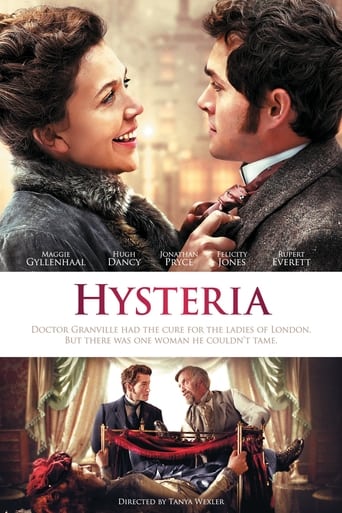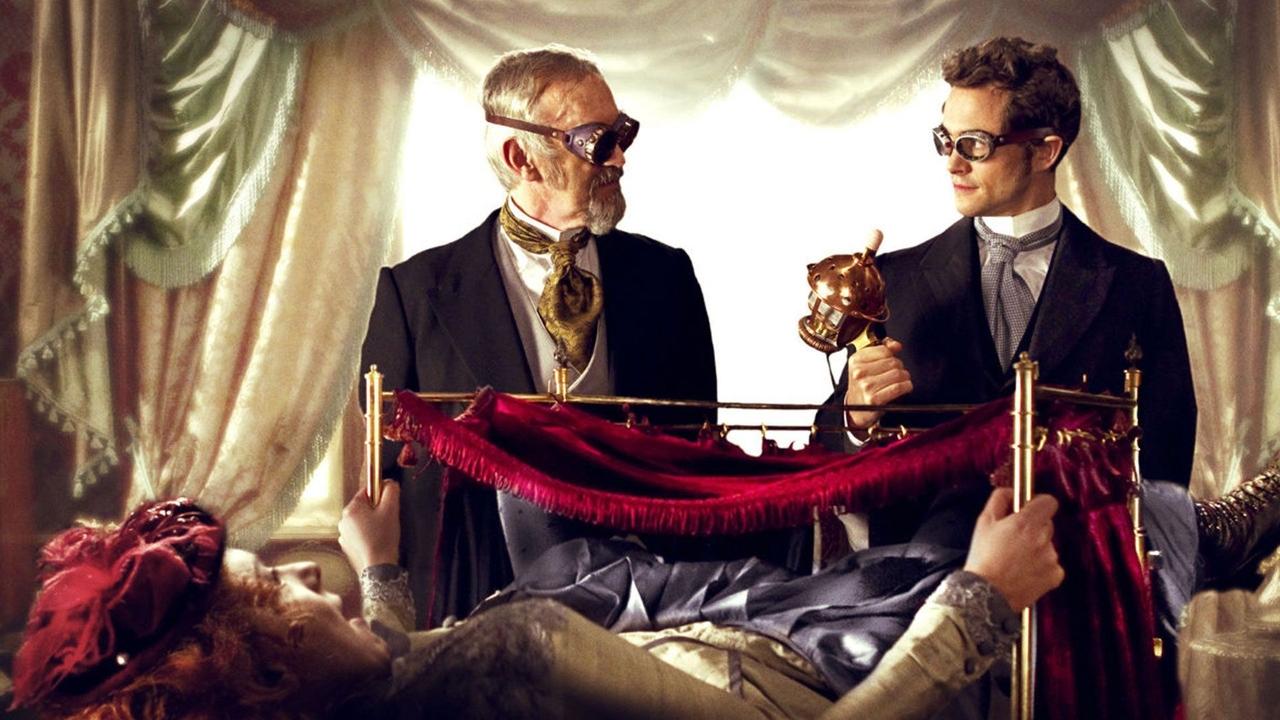grantss
Surprisingly good. Was expecting a rather dry, documentary-style movie and it turned out to be quite funny, and thought-provoking. Despite it's potentially- raunchy subject, it manages to avoid all the easy dirty jokes and innuendo, and tells the story with sensitivity and a straight face. Also makes a case for women's lib.Superb performances all round. Maggie Gyllenhaal is delightful and Hugh Dancy is charming. Good support from Jonathan Pryce and Felicity Jones. The hidden gem is Rupert Everett's performance as the eccentric scientist.
Jafar Iqbal
In 1880's London an ambitious doctor called Mortimer Granville gets a job with Dr Dalrymple, who has the unique skill of relieving his female patients' frustrations with pelvic massaging. Building on this concept, Granville turns a feather duster into an instrument of pleasure, essentially creating the world's first vibrator.It's pretty unusual that a film is based entirely around the creation of the vibrator, but we are talking about quite possibly THE most popular sex-toy in the world. The story is actually quite an interesting one, albeit an amusing one. How director Tanya Wexler chose to tell the story would determine the success of the movie.Maybe it's because she's a woman, but Wexler has ended up telling the story exactly as it needed to be told – with tongue firmly in cheek. Using Stephen and Jonah Lisa Dyer's solid script, Wexler has crafted a light-hearted and amusing piece of cinema that understands the joke and doesn't try to shy away from it.It's because the film has such a tongue-in-cheek nature that the inclusion of a love triangle irks me a little bit. Perhaps the tale of the two sisters vying for Granville's (Hugh Dancy) heart is a part of the true story, but it feels very forced, as if put in there to make it more cinematic. It takes away from the main story as a result, lessening it's appeal.The silver lining of the love triangle, though, is that it allows us to get some very good performances from Felicity Jones and Maggie Gyllenhaal. Jones and Dancy are good in their roles, there's no argument there, but Gyllenhaal is the MVP of the film. Doing an incredibly realistic London accent, she steals the show as the rebellious and impulsive Charlotte Dalrymple, more interested in womens' rights than the honour and respect of her family. This is in contrast to sister Emily (Jones), who is the perfect English rose, but a tad boring. It doesn't take a rocket scientist to work out who Granville chooses in the end, but at least we get some good acting out of it.'Hysteria' pretty much stayed under the radar on it's release, and it's easy to see why. It doesn't break any major boundaries, and doesn't boast any fantastic performances or memorable moments. It's just a very sweet, albeit slightly cheeky, film that could be better and could be worse. A film you could watch on a quiet night in, if you get bored of the dildo.
Armand
an admirable work. and this is not a surprise. first - for the cast. second - the script, subtle, seductive, mixture of accuracy and precise lines of joy. an old fashion style romantic comedy. same rules, same science of detail. and history of a classic pleasure instrument. the Victorian atmosphere is perfect spice in this case. and good plate for rehabilitation of masterclass humor. I admit , I am subjective. Hugh Dancy and Rupert Everett are two of my favorite actors. and Maggie Gyllenhaal seems be, in this film, a version of Katherine Hepburn. but, more that, it is just an adorable, lovely, seductive comedy. and it is enough !
selffamily
I had heard great things of this movie, so I was delighted to see it at my local video store, having missed it on release, and grabbed it. I was disappointed. I found Dr Granville Mortimer to be ineffectual and unconvincing, while the sister he wasn't engaged to was over the top and too ardent about her passionate fight for social(with incidentally the cleanest, smartest place in the slums ever seen), and real issues. I felt that the whole film was a token effort - the queues of middle aged ladies, the tidy slums, and the enormous leap between social classes, so easily made. I was disappointed to see the esteemed Jonathon Pryce in his role, I felt he could do better somehow. For me the film fell between two stools, neither really funny (just the odd chuckle) nor a solid statement about the state of women's life as it was. And so predictable with the sisters.


 AD
AD





